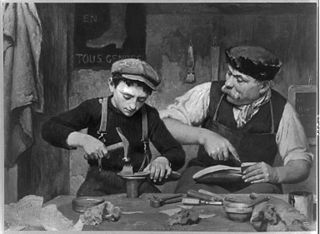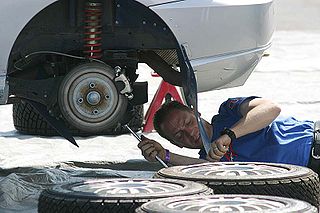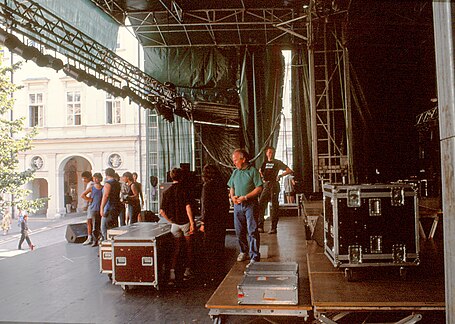
Vocational education is education that prepares people for a skilled craft. Vocational education can also be seen as that type of education given to an individual to prepare that individual to be gainfully employed or self employed with requisite skill. Vocational education is known by a variety of names, depending on the country concerned, including career and technical education, or acronyms such as TVET and TAFE. TVE refers to all forms and levels of education which provide knowledge and skills related to occupations in various sectors of economic and social life through formal, non-formal and informal learning methods in both school-based and work-based learning contexts. To achieve its aims and purposes, TVE focuses on the learning and mastery of specialized techniques and the scientific principles underlying those techniques, as well as general knowledge, skills and values.

Training is teaching, or developing in oneself or others, any skills and knowledge or fitness that relate to specific useful competencies. Training has specific goals of improving one's capability, capacity, productivity and performance. It forms the core of apprenticeships and provides the backbone of content at institutes of technology. In addition to the basic training required for a trade, occupation or profession, training may continue beyond initial competence to maintain, upgrade and update skills throughout working life. People within some professions and occupations may refer to this sort of training as professional development. Training also refers to the development of physical fitness related to a specific competence, such as sport, martial arts, military applications and some other occupations.

Apprenticeship is a system for training a new generation of practitioners of a trade or profession with on-the-job training and often some accompanying study. Apprenticeships may also enable practitioners to gain a license to practice in a regulated occupation. Most of their training is done while working for an employer who helps the apprentices learn their trade or profession, in exchange for their continued labor for an agreed period after they have achieved measurable competencies.

An electrician is a tradesperson specializing in electrical wiring of buildings, transmission lines, stationary machines, and related equipment. Electricians may be employed in the installation of new electrical components or the maintenance and repair of existing electrical infrastructure. Electricians may also specialize in wiring ships, airplanes, and other mobile platforms, as well as data and cable lines.
An electrical lighting technician, or simply lighting technician, are involved with rigging stage and location sets and controlling artificial, electric lights for art and entertainment venues or in video, television, or film production.

A key grip is a senior role on movie sets, involved with a wide variety of behind-the-scenes tasks. The key grip supervises grip crews who support camera and lighting technicians; assesses what equipment is necessary for each shooting location; coordinates the transportation of this equipment and its set up; and arranges the general movement and positioning of the camera and collaborating with the director of photography. The key grip relies on the best boy as their foreperson to supervise the grip crew.

Commercial diving may be considered an application of professional diving where the diver engages in underwater work for industrial, construction, engineering, maintenance or other commercial purposes which are similar to work done out of the water, and where the diving is usually secondary to the work.

Profibus is a standard for fieldbus communication in automation technology and was first promoted in 1989 by BMBF and then used by Siemens. It should not be confused with the Profinet standard for Industrial Ethernet. Profibus is openly published as type 3 of IEC 61158/61784-1.
In a film crew, there are two kinds of best boy: best boy electric and best boy grip. They are assistants to their department heads, the gaffer and the key grip, respectively. In short, the best boy acts as the foreman for the department. A woman who performs these duties may be called best girl. Recently, some film crews are adopting gender-neutral terms for job titles, with one example being 'lead electric' as a replacement for the term 'best boy' in the electrical department. In 2024, the International Alliance of Theatrical Stage Employees has most recently adopted the terms assistant chief lighting technician and 2nd company grip for the electric and grip departments, respectively.
A millwright is a craftsman or skilled tradesman who installs, dismantles, maintains, repairs, reassembles, and moves machinery in factories, power plants, and construction sites.

A diener is a morgue worker responsible for handling, moving, and cleaning the corpse. In the UK, the equivalent job title is "mortuary assistant", whilst the preparation, evisceration and reconstruction of the deceased is performed by an anatomical pathology technician. In the US, dieners are also referred to as "mortuary assistants" or "autopsy technicians". The word is derived from the German word Leichendiener, which literally means corpse servant.
Historically, an armourer is a person who makes personal armour, especially plate armour. Historically armourers were often men, but women could also undertake the occupation: for example Alice la Haubergere worked as an armourer in Cheapside in the early 1300s and in 1348 Eustachia l’Armurer was training her husband's daughter, likely in the field.
British Standard BS 7671 "Requirements for Electrical Installations. IET Wiring Regulations", informally called in the UK electrical community "The Regs", is the national standard in the United Kingdom for electrical installation and the safety of electrical wiring systems.

The light board operator, is the electrician who operates and may even program the light board. They are considered part of the "Electrics" Department or LX Department. All non-design elements of lighting will be handled by the LX Department, i.e. electricians. Light board operators mainly are responsible for decoding the light designer's ideas from paper to opening night ready. In some cases, the light board operator is also the light designer.

A catwalk is an elevated service platform from which many of the technical functions of a theater, such as lighting and sound, may be manipulated.

An auto mechanic is a mechanic who services and repairs automobiles, sometimes specializing in one or more automobile brands or sometimes working with any brand. In fixing cars, their main role is to diagnose and repair the problem accurately and quickly. Seasoned auto repair shops start with a (Digital) Inspection to determine the vehicle conditions, independent of the customers concern. Based on the concern, the inspection results and preventative maintenance needs, the mechanic/technician returns the findings to the service advisor who then gets approval for any or all of the proposed work. The approved work will be assigned to the mechanic on a work order. Their work may involve the repair of a specific part or the replacement of one or more parts as assemblies. Basic vehicle maintenance is a fundamental part of a mechanic's work in modern industrialized countries, while in others they are only consulted when a vehicle is already showing signs of malfunction.
A biomedical engineering/equipment technician/technologist or biomedical engineering/equipment specialist is typically an electro-mechanical technician or technologist who ensures that medical equipment is well-maintained, properly configured, and safely functional. In healthcare environments, BMETs often work with or officiate as a biomedical and/or clinical engineer, since the career field has no legal distinction between engineers and engineering technicians/technologists.
A theatrical technician, also known as a theatrical tech, theatre technician, or theatre tech is a person who operates technical equipment and systems in the performing arts and entertainment industry. In contrast to performers, this broad category contains all "unseen" theatrical personnel who practice stagecraft and are responsible for the logistic and production-related aspects of a performance including designers, operators, and supervisors.
The Association of British Theatre Technicians (ABTT) is a British charitable organisation representing technical staff working within theatre.

Diver training is the set of processes through which a person learns the necessary and desirable skills to safely dive underwater within the scope of the diver training standard relevant to the specific training programme. Most diver training follows procedures and schedules laid down in the associated training standard, in a formal training programme, and includes relevant foundational knowledge of the underlying theory, including some basic physics, physiology and environmental information, practical skills training in the selection and safe use of the associated equipment in the specified underwater environment, and assessment of the required skills and knowledge deemed necessary by the certification agency to allow the newly certified diver to dive within the specified range of conditions at an acceptable level of risk. Recognition of prior learning is allowed in some training standards.













